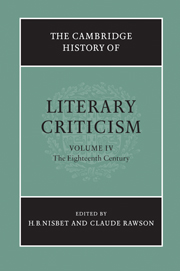Book contents
- Frontmatter
- INTRODUCTION: CRITICISM AND TRADITION
- GENRES
- 3 Poetry, 1660-1740
- 4 Poetry, after 1740
- 5 Drama, 1660-1740
- 6 Drama, after 1740
- 7 Prose fiction: France
- 8 Prose fiction: Great Britain
- 9 Prose fiction: Germany and the Netherlands
- 10 Historiography
- 11 Biography and autobiography
- 12 Criticism and the rise of periodical literature
- LANGUAGE AND STYLE
- THEMES AND MOVEMENTS
- LITERATURE AND OTHER DISCIPLINES
- Bibliography
- Index
- References
11 - Biography and autobiography
from GENRES
Published online by Cambridge University Press: 28 March 2008
- Frontmatter
- INTRODUCTION: CRITICISM AND TRADITION
- GENRES
- 3 Poetry, 1660-1740
- 4 Poetry, after 1740
- 5 Drama, 1660-1740
- 6 Drama, after 1740
- 7 Prose fiction: France
- 8 Prose fiction: Great Britain
- 9 Prose fiction: Germany and the Netherlands
- 10 Historiography
- 11 Biography and autobiography
- 12 Criticism and the rise of periodical literature
- LANGUAGE AND STYLE
- THEMES AND MOVEMENTS
- LITERATURE AND OTHER DISCIPLINES
- Bibliography
- Index
- References
Summary
Biography begins during the eighteenth century to develop a substantial body of critical assumptions and terminology, though a fully elaborated account of its form and subject-matter does not emerge until the nineteenth century. When the term ‘biographer‘ first entered the English language, it was applied interchangeably to an historian or to a writer of individual lives. While the Oxford English Dictionary lists the first use of the word as John Dryden's in the 1683 introduction to his edition of Plutarch, ‘biography’ was earlier employed in the modern sense in the lives of Thomas Fuller (1661) and Oliver Cromwell (1663), where it meant the history of a particular individual. Dryden, following Francis Bacon's earlier categorization, divides history into three types – annals or chronicles, general history or narrative, and biographia. Dryden imagined biography as a more circumscribed and less dignified (but more pleasurable) branch of history because it limited its treatment to aspects directly relevant to an individual man's fortune.
The formulation of biographical and autobiographical theory at first appears primarily in casual remarks occasioned by prefaces and reviews rather than in discrete essays. In addition, occasional critical comments are interspersed in criminal accounts, anecdotes, scandalous memoirs, fictional biographies, newspapers, and legal documents that incorporate biographical approaches and techniques. Biography in its earliest manifestations also frequently commingled with other genres of individuation such as novels, diaries and letters. The memoir, for example, with its daily record of public affairs, often interweaved fiction and history with biography and autobiography. Georges May's argument that the genealogies of English and French life-histories were different is convincing when he writes, ‘British biography developed earlier and more fully than French biography… because it evolved more directly from historiography, whereas in France, it emerged primarily (and slowly) from memoir writing and fiction’ (p. 156).
- Type
- Chapter
- Information
- The Cambridge History of Literary Criticism , pp. 302 - 315Publisher: Cambridge University PressPrint publication year: 1997

